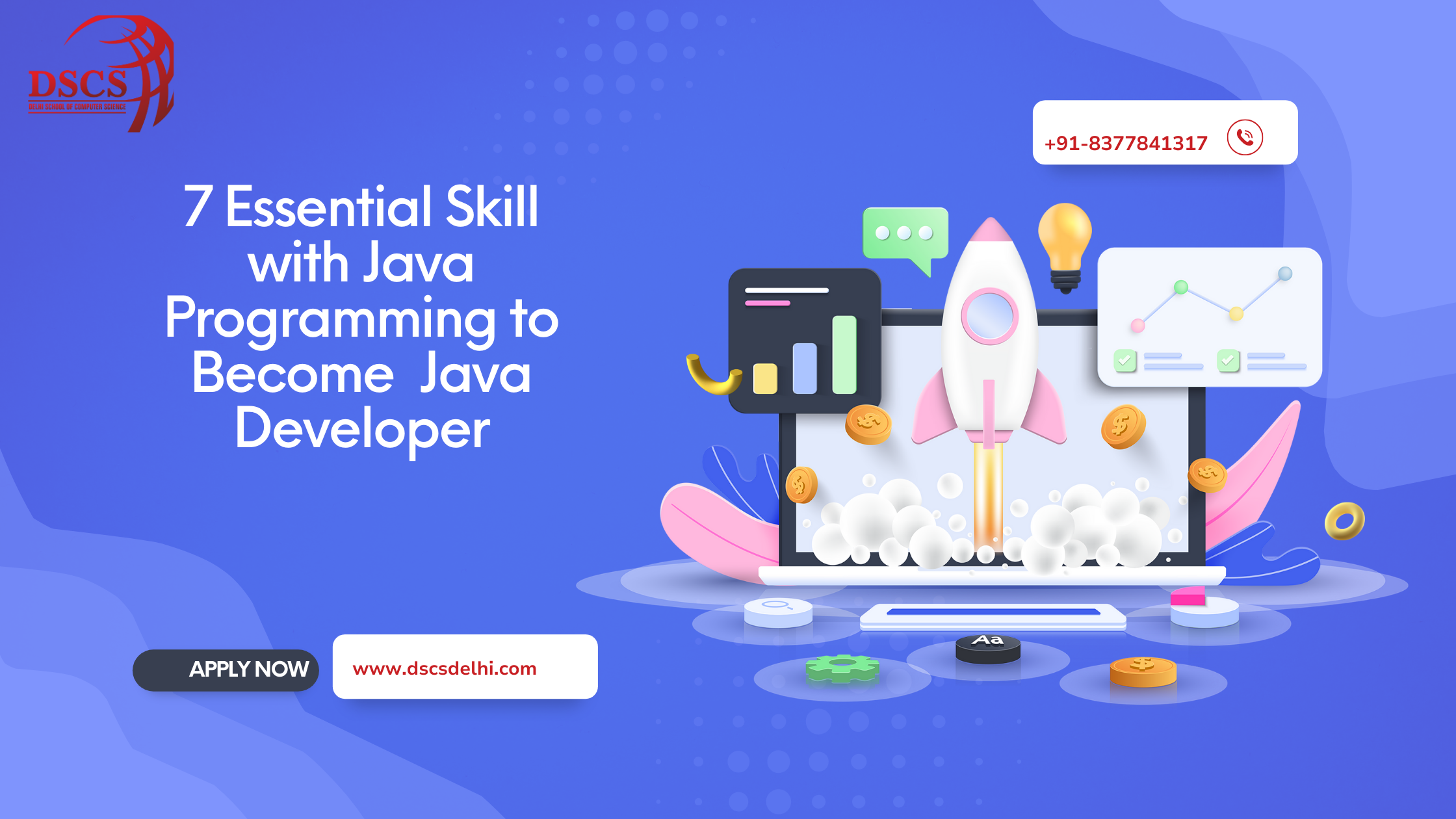Becoming a full-stack Java developer requires a diverse skill set that spans both front-end and back-end development. Java is a versatile and powerful programming language used in a variety of applications, and mastering it across the entire development stack opens doors to exciting opportunities. In this guide, we’ll explore the top 7 essential skills you need to become a proficient full-stack Java developer.
1. Core Java Proficiency:
A strong foundation in core Java is the cornerstone of full-stack development. Ensure you have a deep understanding of fundamental concepts such as:
- Object-Oriented Programming (OOP): Grasp key OOP principles like encapsulation, inheritance, and polymorphism. This forms the basis for building modular and scalable applications.
- Data Structures and Algorithms: Develop proficiency in data structures (e.g., lists, trees, queues) and algorithms to solve complex problems efficiently. Strong algorithmic skills are crucial for optimizing code performance.
- Multithreading and Concurrency: Learn how to manage multiple threads and ensure smooth concurrent execution of tasks. Understanding synchronization and threading models is vital for building responsive applications.
2. Web Development with Java EE (Enterprise Edition):
Java EE provides a robust platform for building enterprise-level web applications. Master the following key components:
- Servlets and JSP (JavaServer Pages): Understand how to create dynamic web pages using servlets and JSP. Servlets handle server-side requests, while JSP allows for embedding Java code within HTML.
- JavaBeans: Learn how to create reusable components with JavaBeans. These components are essential for building modular and maintainable web applications.
- JDBC (Java Database Connectivity): Gain proficiency in database interaction using JDBC. Understand how to connect to databases, execute queries, and manage transactions.
3. Front-End Technologies:
A full-stack Java developer should be well-versed in front-end technologies to create visually appealing and interactive user interfaces. Key skills include:
- HTML, CSS, and JavaScript: Master the trio of web development—HTML for structure, CSS for styling, and JavaScript for dynamic behavior. Understand DOM manipulation and AJAX for seamless asynchronous communication with the server.
- Front-End Frameworks: Explore popular front-end frameworks like Angular, React, or Vue.js. These frameworks enhance the development of complex user interfaces and ensure a smooth user experience.
4. Spring Framework:
Spring is a comprehensive framework that simplifies Java development and is widely used in enterprise applications. Essential Spring skills include:
- Spring Boot: Learn how to rapidly build and deploy microservices and stand-alone applications using Spring Boot. It simplifies the configuration process, allowing developers to focus on application logic.
- Spring MVC: Understand the Model-View-Controller architecture provided by Spring MVC for building scalable and maintainable web applications. Learn to handle HTTP requests, manage controllers, and integrate with views.
- Dependency Injection and Aspect-Oriented Programming: Grasp the concepts of dependency injection, which enhances modularization and testability. Explore aspect-oriented programming (AOP) for handling cross-cutting concerns.
5. RESTful APIs and Web Services:
In modern web development, creating and consuming RESTful APIs is a crucial skill. Understand how to design and implement APIs using technologies such as:
- REST Principles: Familiarize yourself with the principles of Representational State Transfer (REST). Learn about resource identification, stateless communication, and the use of standard HTTP methods.
- Spring REST: Explore Spring’s support for building RESTful services. Learn how to create endpoints, handle requests and responses, and implement features like versioning and documentation.
- SOAP (Simple Object Access Protocol): Understand the basics of SOAP-based web services. While REST is prevalent, SOAP is still used in various enterprise scenarios, and a full-stack developer should be familiar with both.
6. Database Management:
Effective data management is integral to full-stack development. Acquire skills in:
- Relational Database Systems: Gain proficiency in working with relational databases like MySQL, PostgreSQL, or Oracle. Understand database design, normalization, and indexing for optimal performance.
- ORM (Object-Relational Mapping): Explore ORM frameworks like Hibernate. ORM simplifies database interactions by mapping Java objects to database entities, eliminating the need for complex SQL queries.
- NoSQL Databases: Familiarize yourself with NoSQL databases like MongoDB or Cassandra. These databases are suitable for scenarios where a flexible and scalable data model is required.
7. Version Control and DevOps:
Collaboration and efficient project management are essential for successful full-stack development. Develop skills in:
- Git: Master version control using Git for tracking changes in your codebase. Understand branching, merging, and collaborating with others through platforms like GitHub or GitLab.
- Continuous Integration/Continuous Deployment (CI/CD): Familiarize yourself with CI/CD pipelines to automate testing and deployment processes. Jenkins, Travis CI, or GitLab CI are popular tools in this domain.
- Containerization and Orchestration: Learn about containerization with Docker and container orchestration with Kubernetes. These technologies facilitate consistent deployment and scaling of applications across different environments.
Conclusion:
Becoming a proficient full-stack Java developer involves mastering a diverse set of skills that span both front-end and back-end development. Start by establishing a solid foundation in Java and gradually expand your expertise to encompass web development, frameworks like Spring,
Explore the world of Java programming course in laxmi nagar with our comprehensive course in Laxmi Nagar. Whether you’re a beginner or looking to enhance your skills, our program covers core Java concepts, object-oriented programming, and hands-on projects. Join us to delve into Java’s vast capabilities, from building applications to mastering industry-relevant frameworks.



